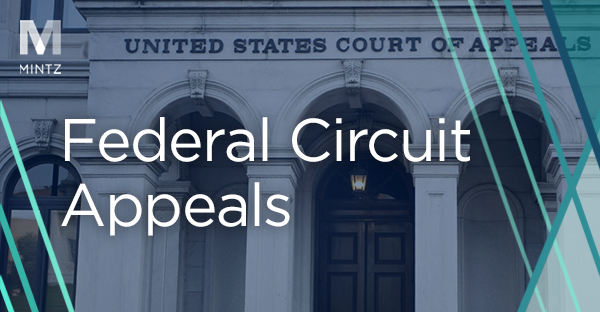
Federal Circuit Appeals
Viewpoints
Filter by:
Federal Circuit Affirms PTAB’s Analysis Finding Product-by-Process Claim Narrowed During Prosecution Valid Over Prior Art
March 14, 2025 | Blog | By Joe Rutkowski, Peter Cuomo
Split Decisions: Can a Complaint Serve as Knowledge of Indirect Infringement?
July 21, 2023 | Blog | By Daniel Weinger, Simone Yhap
A frequent issue seen within patent litigation is whether serving a complaint satisfies the knowledge requirement for post-complaint indirect infringement. This issue affects the amount of, if any, damages a patent owner can obtain.
Federal Circuit Affirms Delisting of REMS System Patent from FDA Orange Book
March 6, 2023 | Blog | By Peter Cuomo, Adam Samansky, Peter McFadden
On February 24, 2023, the U.S. Court of Appeals for the Federal Circuit, in Jazz Pharmaceuticals, Inc., v. Avadel CNS Pharmaceuticals, LLC, Case No. 23-1186, affirmed a decision from the District Court of Delaware directing Jazz Pharmaceuticals, Inc. (“Jazz”) to delist U.S. Patent No. 8,731,963 (the “’963 patent”) from the FDA’s Approved Drug Products with Therapeutic Equivalence Evaluations publication (the “Orange Book”). The district court held, and the Federal Circuit affirmed, that the ’963 patent, which covers Risk Evaluation and Mitigation Strategies (“REMS”) for the narcolepsy drug Xyrem®, failed to claim a drug or method of use, and was thus improperly listed.
Federal Circuit Resolves District Court Split, Holds Foreign Defendant Cannot Defeat Rule 4(k)(2) Personal Jurisdiction by Unilateral Post-suit Consent to Jurisdiction in Alternative Forum
January 23, 2023 | Blog | By Joe Rutkowski, Adam Samansky, Peter Cuomo
On January 9, 2023, the U.S. Court of Appeals for the Federal Circuit in In re Stingray IP Solutions, LLC, No. 23-102 granted a writ of mandamus, vacating a decision of the Eastern District Court of Texas which had transferred a patent infringement suit filed against foreign defendants to the Central District of California based on defendants’ post-suit consent to jurisdiction there.
Year in Review: The Most Popular IP Posts of 2022
January 5, 2023 | Blog | By Christina Sperry
Innovators developing IP strategies for 2023 are reflecting on last year’s key IP issues, including entity size designations for US patent applications, erasures of patent damage awards due to flawed expert opinions, and developments involving the ITC, artificial intelligence and machine learning, and inter partes reviews.
Expert Patent Damages Opinions Hit the Spotlight as Federal Circuit Scuttles Two Patent Infringement Verdicts Worth $1.2 Billion in One Day
March 9, 2022 | Blog | By Andrew DeVoogd, James Thomson
D. Del. Says ANDA Specification Trumps All Else in Infringement Analysis
February 17, 2022 | Blog | By Peter Cuomo, Adam Samansky, Joe Rutkowski, Tianyi Tan
Keep Out: Uniloc Gets Second Chance to Seal Licensing Documents
February 16, 2022 | Blog | By Daniel Weinger, Robert Sweeney
Strengthen Software Claims Against Alice Challenges through Coined Terms and Depicting Technical Advantages in Figures
February 4, 2022 | Blog | By Daniel Weinger, Mark Hammond, Matthew Karambelas
Written Description Requirement Challenges: Federal Circuit Decision Sheds Light on How Expert Testimony Can Help
January 21, 2022 | Blog | By Brad M Scheller, Meena Seralathan
Federal Circuit Affirms Dismissal of Hatch-Waxman Defendants for Lack of Venue and Failure to State a Claim
November 12, 2021 | Blog | By Adam Samansky, Peter Cuomo, Joe Rutkowski
Supreme Court Hammers Final Nail in the IP Bridge v. TCL Coffin
July 2, 2021 | Blog | By Michael Renaud, Daniel Weinger
The Federal Circuit Provides New Guidance for Patent Licensees Wishing to Challenge the Licensed Patent’s Validity
April 21, 2021 | Blog | By Brad M Scheller, Peter Cuomo, Monique Winters Macek, Mark Hammond
Good News/Bad News: Patent Owners and Petitioners Both Make Gains in CAFC Uniloc Decision
March 31, 2021 | Blog | By William Meunier, Sean Casey
Copy Cats II: Nexus of Copying Required to Substantiate Non-Obviousness
February 17, 2021 | Blog | By Ken Jenkins
Federal Circuit Says Automated Systems Are Not Abstract when Tied to Improvements
February 9, 2021 | Blog | By Michael Van Loy, F. Jason Far-hadian, Mark Hammond
Joinder to the Rescue: Federal Circuit holds that joinder of instituted IPRs does not result in estoppel under § 315(e)
October 6, 2020 | Blog | By Peter Cuomo
Federal Circuit Reminds PTAB That Short Cuts Are Not Allowed
August 11, 2020 | Blog | By Brad M Scheller
Sort It Out: Cell Sorting Method with Data Processing Steps Patent Eligible
August 11, 2020 | Blog | By Brad M Scheller
The Standard Does Rule Them All: Federal Circuit Panel Finds Standard Sufficient to Prove Infringement for SEP Compliant Products
August 5, 2020 | Blog | By Michael Renaud, James Wodarski, Daniel Weinger
Explore Other Viewpoints:
- Data Centers & Digital Infrastructure
- AI: The Washington Report
- Antitrust and Federal Regulation
- Appellate
- Arbitration, Mediation & Alternate Dispute Resolution
- Artificial Intelligence
- Awards
- Bankruptcy & Restructuring
- California Land Use
- Cannabis
- Class Action
- Complex Commercial Litigation
- Construction
- Consumer Product Safety
- Corporate Governance (ESG)
- Cross-Border Asset Recovery
- DEI Legal Developments
- Debt Financing
- Direct Investing (M&A)
- Diversity
- EB-5 Financing
- Education & Nonprofits
- Employment
- EnforceMintz
- Environmental (ESG)
- Environmental Enforcement Defense
- Environmental Law
- Environmental, Social, and Corporate Governance (ESG)
- FDA Regulatory
- FDA in Flux
- False Claims Act
- Federal Circuit Appeals
- Financial Institution Litigation
- Government Law
- Growth Equity
- Health Care
- Health Care Compliance, Fraud and Abuse, & Regulatory Counseling
- Health Care Enforcement & Investigations
- Health Care Transactions
- Health Information Privacy & Security
- IP Due Diligence
- IPRs & Other Post Grant Proceedings
- Immigration
- Impacts of a New US Administration
- Insolvency & Creditor Rights Litigation
- Institutional Investor Class Action Recovery
- Insurance & Financial Services
- Insurance Consulting & Risk Management
- Insurance and Reinsurance Problem-Solving & Dispute Resolution
- Intellectual Property
- Investment Funds
- Israel
- Licensing & Technology Transactions
- Life Sciences
- Litigation & Investigations
- M&A Litigation
- ML Strategies
- Managed Care
- Medicare, Medicaid and Commercial Coverage & Reimbursement
- Mergers & Acquisitions
- Patent Litigation
- Patent Prosecution & Strategic Counseling
- Pharmacy Benefits and PBM Contracting
- Portfolio Companies
- Privacy & Cybersecurity
- Private Client
- Private Equity
- Pro Bono
- Probate & Fiduciary Litigation
- Products Liability & Complex Tort
- Projects & Infrastructure
- Public Finance
- Real Estate Litigation
- Real Estate Transactions
- Real Estate, Construction & Infrastructure
- Retail & Consumer Products
- Securities & Capital Markets
- Securities Litigation
- Social (ESG)
- Special Purpose Acquisition Company (SPACs)
- Sports & Entertainment
- State Attorneys General
- Strategic IP Monetization & Licensing
- Sustainable Energy & Infrastructure
- Tax
- Technology
- Technology, Communications & Media
- Technology, Communications & Media Litigation
- Trade Secrets
- Trademark & Copyright
- Trademark Litigation
- Unified Patent Court (UPC)
- Value-Based Care
- Venture Capital & Emerging Companies
- White Collar Defense & Government Investigations
- Women's Health and Technology





